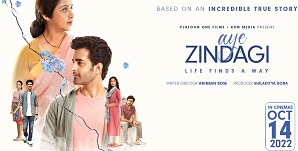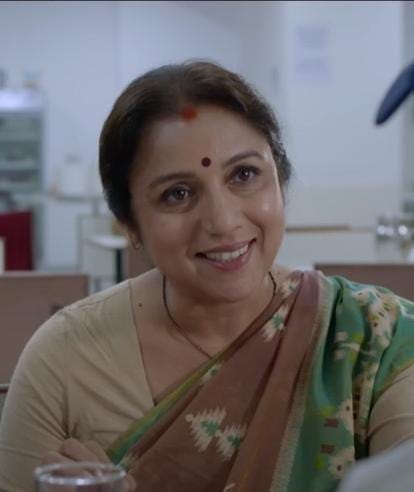|
|
||
|
Pro Tools
FILMFESTIVALS | 24/7 world wide coverageWelcome ! Enjoy the best of both worlds: Film & Festival News, exploring the best of the film festivals community. Launched in 1995, relentlessly connecting films to festivals, documenting and promoting festivals worldwide. Working on an upgrade soon. For collaboration, editorial contributions, or publicity, please send us an email here. User login |
Aye Zindagi, Review: Goodness of human beings, greatness of cinema
Aye Zindagi, Review: Goodness of human beings, greatness of cinema A very touchy, sensitive and polarising subject, Aye Zindagi (O Life) hits the right chords and sticks diligently to its theme and thrust. Based on an “incredible” true story, the film comes across as honest and well-crafted. One can feel emotions similar to those evoked by Anand, made 50 years ago, and Safar, before it, but, though both starred the new star on the horizon, Rajesh Khanna, both were works of fiction, and offered no light at the end of the tunnel. Aye Zindagi touches your soul, makes you cry at the plight of its two central characters, and yet leaves you with a glimmer of hope. This is good cinema, with no trappings or frills, so good that any ‘relief’, in the form of masala or comedy, is made redundant. Named Revathy Rajan in the film, the actress plays a counsellor who approaches relatives of brain dead people to donate their organs for transplant into serious cases of organ malfunction, approaching organ failure. Into her consulting room in Hyderabad walks a young man in his twenties, called Vinayak ‘Vinay’. He has cirrhosis of the liver, though he is a teetotaler. It is in an advanced stage. He often bleeds from his nose, had a distended stomach, swollen feet, jaundice, skin blotches and falling hair. He is from Gwalior and works for a company in Lucknow. Having heard of the organ transplant company, called Mohan Foundation, he travels to Hyderabad, since they do not have any office in Lucknow. It is obvious that he needs a transplant soon, but he does not have the requisite funds—a transplant can cost between Rs. 20-30 lakh (2-3 million). Vinay has lost his mother and his father is not highly placed. His brother Kartik, with whom he has a strained relationship, is studying to become a doctor. They both rally round him. Initially, his bosses in Lucknow take a strict view of his absences and frequent rushes to the wash-room, where he took refuge when he was bleeding. But gradually, the kindness in their heart is kindled, and they decide to support him financially as well as by keeping his job alive. All this is not enough, so a newspaper advertisement is issued, seeking contributions and a poster campaign is launched. Soon, enough money is raised. Then comes the crunch! When will a liver be available? Only livers from brain dead persons can be transplanted, and there is a waiting list of recipients. Once, he collapses in the hospital and is taken care of by nurse Manjula, who develops a liking for him, when he lands up in her ICU ward. The feeling is mutual, but shy and despondent Vinay does not have the courage to express his feelings. And then an incident turns Revathy’s world upside down. That writer-director Anirban Bose is a real-life doctor should not come as a surprise, if you pay careful attention to all the medical terminology and procedures that are delineated in the movie. Dr. Anirban Bose is a nephrologist, who practices as an Inpatient Nephrology Attending at Strong Memorial Hospital. He is also the clinical associate professor at the University of Rochester in upstate NY. He is not only a doctor but also a musician, and enjoys writing. He has published three books, titled Bombay Rains-Bombay Girls, Mice in Men and The Death of Mitali Dotto. Bose got inspired and turned into a director by the true story of a gentleman he met at a fund raising event for organ donation by Mohan Foundation. He struggled for two years to find the right person to direct the film. Then he met producer Shiladitya (Bora), who said YES and things started rolling. In the search for a director, he felt that they were not 'grasping the essence as much as he was like one director that he met, wanted to make it a heart transplant story as it would be perhaps more emotional. So, he finally decided to direct it on his own. He then spent some time learning about film directing, writing, editing and many other aspects. And, O Boy, learn he did. And how! As writer, Bose has played up the conflicts and simplified the organ donation process and the brain death protocols a little. Because, he says, if you make it very true to life, it, sort of, delays the experience or understanding of the elements. But to his credit as debutant writer-director, it does not appear to be his first film, and the conflict does not appear to have been played up. Moreover, though Revathy was always on his mind for the role of the counsellor, he has extracted excellent performances from some less known, even unknown actors. Almost all the actors have speaking parts and all fit-in and blend-in like a well-solved jigsaw puzzle. Three things jarred a bit. First was the use of very loud songs in the first half and the use of songs themselves in the second half. This is no comment on the songs per se. Aye Zindagi would have worked fine, perhaps better, without any song. Secondly, Revathy’s husband is missing in the latter part of the film, at crucial times, when he should have been there, for no explicable reason. Otherwise there is little to fault in Bose’s direction. He uses the jump-cut superimposition, the shifting focus pan, the souped up action to save time on inanities, and many other standard directing techniques seen in the works of some accomplished directors. Don’t be surprised if he is invited to direct a couple of films in the near future. Lastly, there is the trace of faulty Hindi in Revathy’s speech, which is absent from the way her family speaks the language. It is heard in the speech of Manjula, making the character even more slice-of-life. Revathy is a treat to watch. Her Hindi is almost perfect and the slight imperfection actually gives her more character. How much faith Bose has in her is obvious from the fact that he changed all the names of the true-life characters and actors, while retaining the real-life name of the actress. Just for the record, Revathy is one of the first celebrities to sign-up for organ donation. That must have given further boost to her characterisation. But then, in contrast, she is so convincing when, in a candid moment of introspection, she confesses that she never really felt the loss that she said she felt, while counselling families of brain dead individuals to sign-up. Satyajeet Dubey plays Vinay and shows tremendous maturity. He convinces in a host of situations and emotions, even when his countenance is grotesque, and when his persona evokes revulsion. One wonders why does he have only four feature films to talk about, in an 11-year career? Cast as the nurse, Manjula, Mrinmayee Godbole mouths Malayalam, and the Malayalam-tinged Hindi accent and sentence construction, with flair. What she might lack in conventional good looks, she makes up by strong screen presence. Another actor who first appeared on screen in 2011, like Satyajeet. She has done mostly Marathi films, with the exception of Pad Man. You find another natural in Shrikant Verma, cast as Dr. Kapoor, Revathy’s boss. No information was available about the roles played by four other members of the cast, Sawan Tank, Hemant Kher, Pranjal Trivedi and Muskaan Agarwal. But the actor who played Vinay’s brother, Kartik and the actresses who played Revathy’s daughter and the nurse Nusrat, lend very good support. Sound Design and mix by Adeep Singh Manki and Anindit Roy (C.A.S) is up to the mark generally, except when the songs come on full blast. Costume designer Shilpi Agarwal picks and designs the right apparel. Editor Suraj H. Gunjal has done a fine job. Scenes are crisply cut and inserts and split screen are imaginatively used. Length, at 104 minutes, goes well with the theme. Director of photography Surjodeep Ghosh captures people and places, light and shade, with competence, with minimal and only necessary use of the drone camera. Many of the shots are up close and personal, as is the demand of the film. There are very few long shots. Amidst all the action and animation, horror and sex comedies, item songs and epic battle dramas, Aye Zindagi comes like a whiff of fresh air. Although bleak for the most part, it is like life itself, which has fewer highs and greater lows. Be prepared to shed a few tears for the screen personalities you empathise with, but go back really enriched, your faith renewed in the goodness of human beings. It is not easy viewing by any means, but it engages you from the word go. Life is calling. Are you listening? The sub-title below Aye Zindagi says, ‘Life Finds a Way’. You should soon find your way to the nearest multiplex or any other cinema where it is playing. I welcome my first 4-star rating movie in a long time. It is not likely to have a very long run. But some movies are made because the makers (like producer Shiladitya Bora) had abundant passion to see them through, with no compromise whatsoever. Not very often does the goodness of human beings result in greatness of cinema. Here is one such instance. Rating: **** Trailer: https://www.youtube.com/watch?v=892DxAMnqIY 12.10.2022 | Siraj Syed's blog Cat. : Adeep Singh Manki Anand Anindit Roy (C.A.S) Anirban Bose Bombay Rains-Bombay Girls Hemant Kher Mice in Men Mrinmayee Godbole Muskaan Agarwal Pranjal Trivedi Rajesh Khanna Revathy Safar Satyajeet Dubey Shiladitya Bora Shilpi Agarwal Shrikant Verma Suraj H. Gunjal Tank Surjodeep Ghosh The Death of Mitali Dotto Independent FILM
|
LinksThe Bulletin Board > The Bulletin Board Blog Following News Interview with EFM (Berlin) Director
Interview with IFTA Chairman (AFM)
Interview with Cannes Marche du Film Director
Filmfestivals.com dailies live coverage from > Live from India
Useful links for the indies: > Big files transfer
+ SUBSCRIBE to the weekly Newsletter Deals+ Special offers and discounts from filmfestivals.com Selected fun offers
> Bonus Casino
User imagesAbout Siraj Syed Syed Siraj Syed Siraj (Siraj Associates) Siraj Syed is a film-critic since 1970 and a Former President of the Freelance Film Journalists' Combine of India.He is the India Correspondent of FilmFestivals.com and a member of FIPRESCI, the international Federation of Film Critics, Munich, GermanySiraj Syed has contributed over 1,015 articles on cinema, international film festivals, conventions, exhibitions, etc., most recently, at IFFI (Goa), MIFF (Mumbai), MFF/MAMI (Mumbai) and CommunicAsia (Singapore). He often edits film festival daily bulletins.He is also an actor and a dubbing artiste. Further, he has been teaching media, acting and dubbing at over 30 institutes in India and Singapore, since 1984.View my profile Send me a message The EditorUser contributions |





























